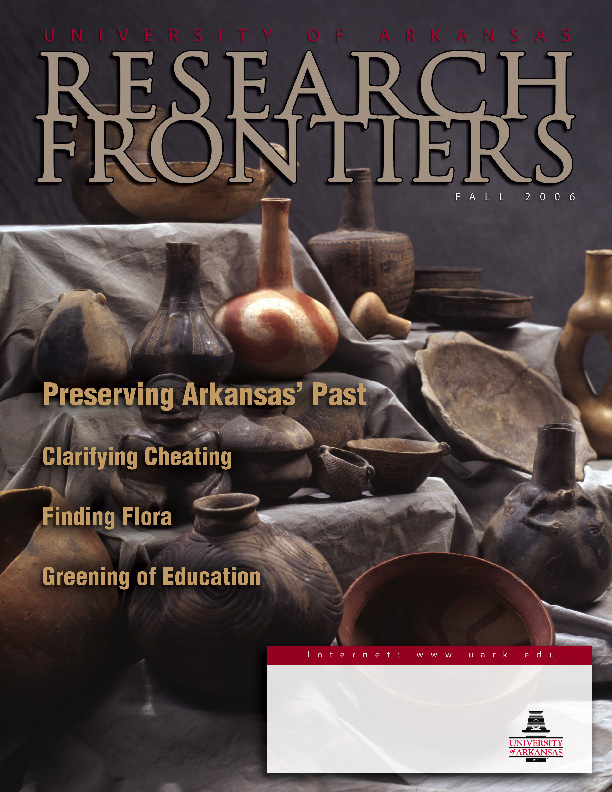FAYETTEVILLE, Ark. — Preserving Arkansas artifacts, examining the culture of cheating, documenting Arkansas plants, constructing the architecture of education reform — University of Arkansas researchers do all of this and more in the fall 2006 issue of Research Frontiers, which is now available online.
The story featured on the cover of Research Frontiers documents the career of Sam Dellinger, a professor of zoology who worked to keep pre-Columbian artifacts from leaving Arkansas. Dellinger’s efforts resulted in one of the best collections of pre-Columbian artifacts in the world, according to Robert Mainfort, professor of anthropology and curator of an exhibit on Dellinger, which is currently showing at the Old State House Museum in Little Rock. Thanks to Dellinger’s leadership, researchers can study woven grass mats, elaborate pottery vessels, shell jewelry and other items to help learn more about the history and culture of the people who inhabited Arkansas before the first Europeans arrived.
Accounting professor Tim West stumbled onto an entirely different kind of culture while teaching a course one semester. During the semester, he learned that the majority of his students had cheated on a take-home examination. Instead of failing the students, he decided to throw out that particular test and he developed a questionnaire to try to determine the underlying motives for student cheating. His findings provide insight into a phenomenon he calls “ethical distancing,” which encompasses a number of ways that these students rationalize cheating.
Johnnie Gentry, professor of biological sciences, and his colleagues won’t be cutting any corners in their quest to classify and characterize the vascular plants of Arkansas. Their efforts to document the flora statewide have led them to find compounds that might prevent cancer, invasive species and a host of rare plants. Their work will result in the publication of a book scheduled to appear in 2014.
The future is what Jay Greene, head of the department of education reform, wants to change. In an interview in Research Frontiers, Greene discusses what he thinks are the most important issues in kindergarten through 12th grade education today. The interview is also continued on the Web, with expanded answers to questions in the magazine and additional questions not covered in the magazine. To listen to his views on education reform, please visit: http://researchfrontiers.uark.edu/9266.htm.
The arts and letters page features the duo Novaria, with James Greeson on guitar and Ronda Mains on flute. Readers can listen to samples of their music at http://researchfrontiers.uark.edu/9254.htm.
The research of graduate student RaeGina Covington examines the history of the migration of African Americans from Arkansas to East St. Louis in the early 20th century. Covington has spent time in the Arkansas Delta taking photographs to get a feel for the culture, sights and sounds of the region. She also has produced documentary films, including one on Jefferson Elementary School, which closed in Fayetteville, Ark., last year; one on the 100-year anniversary of the Arkansas Traveler, the university’s student-run paper; and one on two farmers in the Arkansas Delta.
Last but not least, in addition to book reviews and research briefs found both on the Web and online, the Web site has an additional question and answer in the U of A Q an A section, answered by professor of finance Wayne Lee: “What is a hedge fund?” Readers are invited to submit questions for U of A Q and A on the Web site at http://researchfrontiers.uark.edu/8407.htm.
Contacts
,
